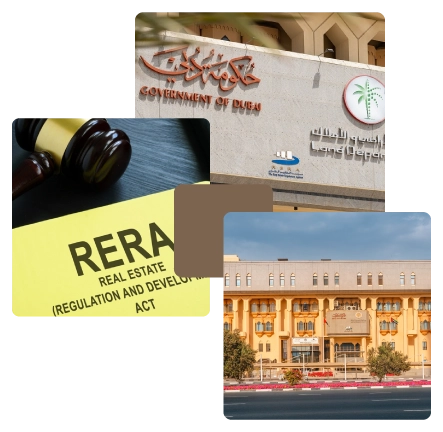Table of Contents
ToggleDubai Government Policies and Regulations in Real Estate

Government policies on real estate and Dubai real estate regulations protects the bustling property landscape of the city. To navigate Dubai’s real estate market, it’s crucial to grasp the significance of Dubai government policies and regulations in real estate. By understanding the government policies on real estate, stakeholders, investors, and industry professionals may make informed decisions. Therefore, guaranteeing legality and encouraging a transparent and secure real estate environment. A thorough understanding of the regulatory environment is essential for navigating the Dubai real estate market. As a result, this promotes ethical and sustainable business practices in this booming industry.
Dubai Land Department (DLD) and the Real Estate Regulatory Authority (RERA)
he Dubai Land Department (DLD) is the governing department of the city’s real estate industry. Its primary duty is controlling and supervising every aspect of this evolving property market. The DLD’s fundamental mission is to protect property buyers and sellers. This is through guaranteeing that every real estate transaction is fair and transparent. The DLD’s jurisdiction encompasses the entire spectrum of Dubai’s real estate environment. That is, from the thorough registration of ownership rights to the issue of construction licenses.
On the other hand, the Real Estate Regulatory Authority (RERA) is part of the DLD. This is in charge of developing and implementing Property laws in Dubai and Dubai real estate regulations. Some of its various responsibilities are managing landlord-tenant relationships, controlling foreign real estate investments, and licensing real estate brokers and developers. This also includes supervising financial and legal organizations involved in the sector. While also actively tracking and directing the real estate market's growth. Essentially, the DLD and RERA work together to protect the rights of everyone in the real estate market. What’s more, they make sure that industry standards are strictly followed in Dubai.



Most Trending Projects in Dubai for You to Pick.
Dubai Government Policies and Regulations in Real Estate Dubai’s Unparalleled Achievements
Amongst the many new attractions in Dubai, two remarkable landmarks stood out embodying the city’s spirit and vision; the Burj Khalifa and Downtown Dubai.

Foreign Property Ownership in Dubai
The bustling city attracts foreign investors with its Property laws in Dubai. This is because it allows ownership to those who are interested in its bustling real estate. Expats and foreign investors can own properties in Dubai in designated freehold ownership zones. This is also under the Dubai property ownership rules.
Dubai’s real estate landscape includes more than 60 freehold zones, including existing and new developments. Freehold properties are essentially those in certain places where non-Dubai citizens have full ownership rights over the property.
Individuals possess complete ownership and the freedom to utilize the freehold land. Both under Property laws in Dubai and Dubai real estate regulations. Selling freehold real estate in Dubai simplifies the real estate procedure.
This is because it doesn’t need government approval and only involves a simpler administrative process. Therefore, this Dubai real estate regulation makes freehold properties more appealing and provides for foreigners .
Furthermore, there are some popular freehold zones in Dubai that expatriates can invest in and buy in. These include Dubai Marina, Jumeirah Lake Towers (JLT), and Downtown Dubai. To add, Al Furjan, Al Barari, Jumeirah Beach Residences, and many more.

Dubai Real Estate Development Regulations
All developers operating in Dubai’s real estate market must comply with regulatory requirements to maintain transparency and protect stakeholders’ and investors’ interests. Every real estate developer needs to register with the Dubai Real Estate Regulatory Agency (RERA).
This is an important step in the process. To obtain this registration, developers need to provide proof of their financial and logistical commitments to the project. This is in addition to a thorough business plan detailing the goals and scope of the project.
After their successful registration, the laws and regulation requires the developers to provide comprehensive project information, including location, size, and type of unit. This encompasses compliance with advertising regulations, disclosing project specifics, and instituting procedures for resolving disputes.
Developers must understand that noncompliance with RERA standards can result in penalties, such as fines or project suspension. Thus, emphasizing the importance of regulatory compliance in the Dubai real estate sector.

Dubai’s 3D Printing Strategy 2030

Dubai Strata Law
- Dubai has real estate laws that define the legal parameters of joint ownership and strata properties. This is in effort to maintain an open and well-structured real estate market.
These rules strictly regulate properties with shared ownership systems and are part of the Dubai Strata Laws. The rules include several topics, such as property subdivision and the creation and operation of owners' associations. As well as the division between individual obligations in joint developments.
Rental and Tenancy Laws in Dubai
Four major laws established by RERA form the foundation of Dubai’s tenancy law system. The foundation is in the Law No. (26) of 2007, which describes in great detail the interactions between renters and landlords. Building on this, Law No. (33) of 2008 improved the landlord-tenant relationship. This is by revising some provisions in the regulatory framework.
Additionally, the Rent Disputes Settlement Centre (RDSC), follows Decree No. (26) of 2013. It is a vital organization that settles all kinds of rental issues in Dubai.To add, the city's explicit Dubai real estate regulations governing rent hikes are in Decree No. (43) of 2013. Landlords and tenants must learn and abide by these Dubai real estate regulations. These serve as the foundation for a safe, regulated rental environment in Dubai. As a result, guaranteeing equity, openness, and efficient dispute settlement.
FAQs
Dubai Land Department governs real estate transactions in Dubai and covers aspects like property registration, ownership, and transfer procedures.
Foreign investors can own property in specific designated areas or through long-term leasehold arrangements. Understanding these regulations is crucial for foreign investors interested in the Dubai real estate market.
While foreign nationals can own various types of properties, certain restrictions may apply based on the property's location. It's essential to be aware of these restrictions and compliance requirements.
The Dubai government implements measures such as the Real Estate Regulatory Agency (RERA). This regulates the real estate market, and protects the rights of buyers and sellers. Hence, ensuring fair and transparent property transactions.
RERA regulates off-plan property sales, with specific procedures and protections for buyers. This includes the requirement for developers to use escrow accounts, safeguarding property purchases until project completion.
Latest Projects in Dubai









Adil khan
Share This Post
Found this information useful? Share it with your friends and family!
Leave your information so that our expert can consult you in the best way possible
Share your details for personalized expert guidance – let us assist you in the most effective way!


